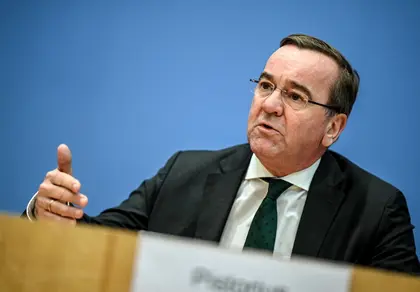Boris Pistorius, Germany’s incoming defense minister, is an unknown on the world stage but an experienced politician with credentials in security and a history of straight talking.
Pistorius, 62, from Chancellor Olaf Scholz’s Social Democrats (SPD), will graduate to the job from his current post as interior minister in Lower Saxony state, which he has held since 2013.
JOIN US ON TELEGRAM
Follow our coverage of the war on the @Kyivpost_official.
Der Spiegel magazine called his appointment “a real surprise” and nicknamed him the “red general” for the color of the SPD and his hard-charging style.
It described him as a “sharp-tongued” official who has “repeatedly made his mark on domestic policy”, especially through much-lauded efforts to reform the police in his state.
“Pistorius is considered impatient, occasionally comes across as brash and can sometimes barely conceal it when he is annoyed with others,” public broadcaster NDR wrote of him in September.
However, NDR also praised his ability to “get the job done”, while also looking beyond regional concerns “to Europe and to federal politics”.
In May last year, Pistorius was forthright about Ukraine’s right to recapture territories taken by Russia, putting him at odds with many other Social Democrats who had been reluctant to endorse a counter-offensive.
- ‘Well-connected’ -
“The recapture of occupied territories is legitimate and completely correct and must also be supported by us. Ukraine must win the war,” he told the TV show “Beisenherz”.

Putin Hints Precondition for Peace Talks: Neutered Ukraine
But he was also critical of calls to destabilize Russia, adding: “There will have to come a time after the war... when we in Europe will be able get along with Russia, in whatever form.”
And he was facing accusations from opposition politicians for being too “pro-Kremlin” over comments he made in 2018, in which he questioned sanctions on Russia.
On Tuesday he defended his remarks, telling top tabloid Bild that he did not “criticize the sanctions themselves or their goal, but like many others questioned their effectiveness”.
“Today’s sanctions cannot be compared to the sanctions from back then, and they do work, as we know.”
Born in the northern city of Osnabrueck, Pistorius studied law and worked as an attorney before entering politics in the 1990s, eventually becoming mayor of his hometown.
In Lower Saxony, Pistorius has gained a reputation for his work in renewing the police force and boosting it to combat extremism.
Der Spiegel noted that he is “the most visible” of the state interior ministers, and is “well connected with the security authorities”.
He had previously been rumored to be in the running for the post of federal interior minister, which looks set to be vacated later this year by current postholder Nancy Faeser.
Pistorius is an adaptable politician who has proven several times that he can “communicate robustly”, Thomas Jaeger, a political scientist at the University of Cologne, told news broadcaster NTV.
Pistorius completed his own compulsory military service in the early 1980s, going on to membership of the defense committee in the Bundesrat upper house of parliament. He is still a member of the reserve force.
He has two daughters and was widowed in 2015 when his wife died of cancer.
You can also highlight the text and press Ctrl + Enter










